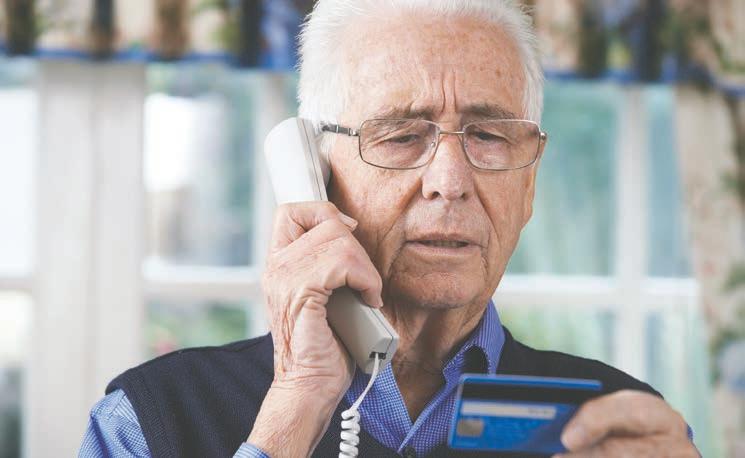
5 minute read
Elder Fraud Targets Seniors
Elder fraud is where fraudsters target your parents, grandparents and those from the elderly community. Fraudsters often take advantage of those who aren’t tech-savvy, so familiarizing yourself with scams can lead to preventing the fraudsters from being successful. Cybersecurity expert Brandon King from Home Security Heroes has compiled a list of tips to spot and prevent fraud.
What is elder fraud and who are the targets?
Advertisement
Fraudsters target seniors in elder fraud by tricking them into giving sensitive information or offering fake financial benefits. Perpetrators could be strangers or known to the elderly, like family, friends or colleagues, and victims can lose their savings and suffer devastating consequences. For example, American seniors aged 60 and above lost over $1.6 billion to fraudsters in 2021 alone.
Older adults are a prime target for fraudsters. They normally target victims in retirement or close to retirement as they have a steady income, excellent credit history and more savings than younger people.
Here are some of the most common scams to be on the lookout for:
Grandparent scams
Scammers often pose as the victim’s grandchild to dupe seniors into sending
It’s essential to maintain social contact with your parents and grandparents and educate them about how times have changed. (Getty images) money urgently for emergency expenses like overdue rent or car repairs. They often ask for secrecy, and in one case, an elderly woman in Ohio was scammed of $20,000 by someone posing as law enforcement in 2019.
Romance scams
Romance scams often target women 50 and above, but men can be victims too. Scammers will usually target seniors who
Homecare
Friends For Life makes it possible for seniors to live in their own home. Our extraordinary family of caregivers can attend to your loved one, so you can get back to being a daughter or son. You can depend on us!
have lost their spouses and are looking for companionship. An example of would-be perpetrators requesting money transfers or gift card vouchers sent to an email address.
False charity scams
Fraudsters may pose as representatives from a real charity or create fictitious charity organizations. They can make calls, text, or send emails. In some cases, they may even
Medicaid Consultants
If you are stuck on where to begin with Medicaid, you are in the right place. We are New York Medicaid experts who care. We will help guide you through the process of Medicaid planning and give you the information necessary to get on the right path.
visit seniors in person. False charity schemes commonly happen after a significant event, like a health crisis, global socio-political campaigns, or a natural disaster.
Medical scams
Seniors may feel overwhelmed by Medicaid, Medicare, the Affordable Care Act, and the recurring complexity of the healthcare system. This can make them vulnerable to criminals. Scammers may impersonate Medicare representatives to entice seniors into disclosing personal information like Social Security numbers.
What are some other common types of elder fraud?
Protecting seniors from scams is crucial, as scammers use various methods to steal personal information and money. Elder scams include fake medical schemes, investment scams, and phishing emails, taking advantage of the complexity of the healthcare system and seniors’ fixed income. To avoid falling victim, seniors and their loved ones should research charities, verify emails and phone calls, and be cautious of unsolicited requests for money or personal information. Additionally, seniors should beware of insurance coverage scams, romance scams, government impersonation, sweepstakes and lottery scams, identity theft, and tech support scams. Taking precautions and being aware of these scams can help prevent them.
Senior Living Advisors
Finding the best housing solutions based on clinical, financial, and cognitive needs. Making the process of finding your loved ones new home easy and stress free!
Tips to prevent seniors from being scammed
• Stay connected to your loved ones to prevent isolation, which makes them more vulnerable to scams.
• Warn them never to share sensitive information and explain why.
• Help them create strong, unique passwords and avoid reusing them.
• Limit online shopping to trusted retailers and check for secure websites.
• Never click on suspicious links in emails, social media messages, texts, or take calls from fake caller IDs.
• Monitor monthly banking statements for signs of identity theft or unauthorized accounts. Shred statements before disposing of them.

• Protect social media accounts by only accepting friend requests from people they know, updating privacy settings, and using multi-factor authentication. Delete messages from strangers and avoid odd payment types.
• Encourage your parents to name you as a Trusted Contact Person to speak with their financial advisors if there are concerns.

• Warn other family and friends if one of your loved ones has experienced a scam attempt. Discuss how to prevent fraudulent attempts.
What to do if a senior has been a victim of elder fraud

If an elderly person you know has been scammed, it’s important not to panic and to stay calm. Document everything that has happened, including phone call logs, text messages, and emails, and report the scam to the Federal Trade Commission (FTC) and the person’s bank and credit card providers. File a report with the local police and change all passwords to stronger ones, including social media accounts and investment profiles, setting different passwords for each site and enabling 2-Factor Authentication.
Elders can often be vulnerable and isolated, they may not be as tech-savvy therefore are targeted by fraudsters. —Home Security Heroes (www.homesecurityheroes.com) consists of an interview, a talent portion and an evening gown display.


“Twenty percent [of the pageant] is based on a five-minute interview with me and usually three to five other judges,” explained Hoffman. “And it’s based on the application that the contestants submit. And it’s not a beauty pageant; it’s about inner beauty.”
Another 20 percent of the pageant is based on the two-and-a-half-minute talent portion. While Hoffman had never been in a pageant before, she created a dance routine for her talent portion that landed her in the top 10 in Atlantic City for the Ms. Senior America pageant in 2016 after winning her Ms. New York Senior title. While many talents brought to the stage consist of dancing or singing, Hoffman explained that there are many other unique talents ladies have presented.
“Some gals will say, I’d really love to enter, but I don’t have a talent,” said Hoffman. “So I tell them about how we have had artists come up and do a quick painting. We’ve had an author come up and act out a portion of her book. My first runner-up did yoga to music because she’s a yoga instructor.”
Another big component the judges look at during the pageant is how the contestant carries themselves in an evening gown. While presenting themselves in an evening gown, the contestant has 35 seconds to debrief their philosophy of life.
“We look for someone who would be able to speak in public, that can properly represent the organization,” said Hoffman. “So that is really what they’re looking for; it’s not physical beauty.”
This year’s Ms. New York Senior is Mae Caime. Hoffman shared that Queen Caime is 64 years old and her inner beauty is just as great as her outer beauty. According to the New York Senior America website, Queen Caime’s personal statement is, “A smile is the best thing you can wear. It’s a universal language of love, kindness and peace. Never leave home without it.”
Ms. New York Senior and the Senior America organization works to inspire confidence and help friendships blossom.
“I’ve met so many like-minded women and have become close friends with so many of these women,” said Hoffman.
The organization is working on its next big event, the fall fashion show, which will be held in mid-September. To learn more about Ms. New York Senior, visit newyorksenioramerica.org. There may be a crown in your future.









